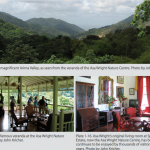ecology
The #3 post so far this year explored how zebra finches reward themselves for singing well:
Dopamine is an important hormone released from neurons involved in reward pathways. Researchers at Cornell University wanted to know if dopamine signaling was involved in how birds learn songs. Their findings, recently published in Science, present evidence that neurons in the brain of zebra finches do in fact decrease dopamine signals when the birds hear an error in their song in comparison to when they sing 'correctly'. The researchers also found that dopamine signaling was enhanced when…
The Neotropical Companion by John Kricher came out years ago, in the late 80s if I recall correctly. I've got a copy of it around somewhere.
I loved that book because it did a great job integrating all the things in one place: animals, plants, habitats, evolution, etc. Even though I was working in the paleotropics at the time, I found it informative.
Then, more recently, I got a revised version of the same book. I've got it around somewhere. It is from the 1990s, I think. Great book, same idea as the first one, but with more in it, and a somewhat larger format. This dates to after my…
Treecology: 30 Activities and Observations for Exploring the World of Trees and Forests is an excellent new nature activity book for kids of a fairly wide range of ages.
Like a tree, the pattern of the book is pretty straightforward but fractal like; you start off simple but end up pretty much anywhere in the world of ecology. The book begins with the basic definition of a tree, simple tree anatomy, some phylogeny, some tree physiology and biology, but then branches off (pun intended) into things that are related to trees, like things that live on them, eat parts of them, etc. Seeds and…
On Pharyngula, PZ Myers doesn't just want cut your grass—he wants to tear it out by the roots and leave it to rot in the sun. He quotes J. Crumpler on The Roaming Ecologist, who calls lawns "sterile, chemically-filled, artificial environments [...] that provide no benefits over the long term; no food, no clean water, no wildlife habitat, and no foundation for preserving our once rich natural heritage." To make matters worse, lawnmower use adds carbon dioxide to the atmosphere, while beautiful bermuda grass requires a lot of H2O in a world that is increasingly insecure about water. During the…
Photographer Jesse Cancelmo was struck by the general lack of understanding of the sea life and ecology of the Gulf of Mexico that became apparent with the big oil spill in 2010, and this inspired him to carry out a major photographic project in the Gulf.
He felt many had written off the Gulf as a post-environmental disaster dead zone. While environmental effects in the Gulf are certainly very important, it is still a living, thriving ecosystem, the product of Candelmo's work, Glorious Gulf of Mexico: Life Below the Blue, attests to this.
This is a stunning coffee table type book (but…
Sean B. Carroll is coming out with a new book called The Serengeti Rules: The Quest to Discover How Life Works and Why It Matters.
This is the molecular biologist Sean Carroll, as distinct from the physicist (who wrote this).
Homeostasis is one of the basic principles of biology. The term can be applied broadly to mean that certain numbers are maintained within a certain range. This could refer to energy flowing through a system, numbers of specific cellular products like enzymes, numbers of individual organisms in an ecological system, etc. It is not so much that numbers don't change.…
A pig flying at the Minnesota state fair. Picture by TCS.
I've been involved in a few discussions of late on science-based sites around yon web on antibiotic resistance and agriculture--specifically, the campaign to get fast food giant Subway to stop using meat raised on antibiotics, and a graphic by CommonGround using Animal Health Institute data, suggesting that agricultural animals aren't an important source of resistant bacteria. Discussing these topics has shown me there's a lot of misunderstanding of issues in antibiotic resistance, even among those who consider themselves…
After this post on antibiotic resistance, many of you may have seen an exchange on Twitter calling me out for being "knee-jerk" about my call to action to do something about the overuse of antibiotics. In that post, I focused on antibiotic use in agriculture, giving only brief mention to human clinical use. There are a number of reasons for this, and while I didn't discuss them extensively on Twitter, I did want to provide an overview here in order to better explain my position and concern about antibiotic use in agriculture.
How are antibiotics used in animal production?
To start, some…
Guest post by Hillary Craddock
Last week a new study regarding Eastern Equine Encephalitis (EEE) was published online (Bingham et.al.). EEE is a mosquito-borne virus that can cause serious, and sometimes deadly, disease in humans and equines. In warmer parts of North America, the virus is spread year-round, but in areas where mosquitoes get killed off in the winter it has been something of a mystery as to how the virus makes it from year to year. Humans and equines are both dead-end hosts, which means that a mosquito can not be infected from biting an infected person or horse. Researchers in…
It is the nature of popular books to inspire people to wildly overstate their importance. The most stunning example is Abraham Lincoln's statement upon meeting Harriet Beecher Stowe in 1862 “So you’re the little lady who wrote the book that started this great war.” While _Uncle Tom's Cabin_ was an incredibly important book, one that moved many people to shift their sympathies on the subject of slavery, this was, of course, the wildest hyperbole. So too are claims that _Diet For a Small Planet_ invented modern vegetarianism, that _The Omnivore's Dilemma_ started the…
August, 1976. A new infection was causing panic in Zaire. Hospitals became death zones, as both patients and medical staff succumbed to the disease. Reports of nightmarish symptoms trickled in to scientists in Europe and the US, who sent investigators to determine the cause and stem the epidemic. Concurrently, they would find out, the same thing was happening hundreds of miles to the north in Sudan. In all, 284 would be infected in that country, and another 358 in Zaire--over 600 cases (and almost 500 deaths) due to a mysterious new disease in just a few months' time.
The new agent was Ebola…
This is the last of 16 student posts, guest-authored by Jessica Waters.
Climatologists have been warning us about the ongoing and impending consequences of global warming for years. But the results of climate change affect more than just polar bears and penguins - if you live anywhere in the northeastern, north-central or west coast states of the U.S.., you could be at a greater risk for contracting Lyme Disease.
Lyme disease is an infection of the Borrelia burgdorferi bacterium that is spread through black legged ticks (otherwise known as deer ticks) who feed on the…
On Earth Day, Greg Laden took the opportunity to thank BP for the “modifications made to the ecosystem of the Gulf of Mexico” by the Deepwater Horizon oil spill. Surviving specimens of coral “have been provided with hip new color schemes (mainly black and blackish),” while creatures such as shrimp and crabs exhibit physical deformities “which will surely make them easier to catch and, according to BP, does not affect their edibility.” Crude oil is organic, after all, as Kevin Bonham reminds us on We Beasties. He says “it turns out that nearly million barrels of oil…
The ecology of antibiotic resistance on farms is complicated. Animals receive antibiotic doses in their food and water, for reasons of growth promotion, disease prophylaxis, and treatment. Other chemicals in the environment, such as cleaning products or antimicrobial metals in the feed, may also act as drivers of antibiotic resistance. Antibiotic-resistant organisms may also be present in the environment already, from the air, soil, or manure pits within or near the barns. Ecologically, it's a mess and makes it more difficult to attribute the evolution and spread of resistance to one…
I rarely write about climate change. As much as it's been hashed out amongst climate scientists, and even many of the former "climate skeptics" have now changed their tune, I readily accept that climate change is happening, and is happening largely due to human activities. More importantly for my field, climate change is also having effects on human health in a number of different ways, from the movement of insect vectors into new areas, to warming of the seas leading to more extreme weather conditions, to the loss of coral reefs and the freshwater that these reefs protect from the…
This guest post was written by Brookhaven Lab science writing intern Kenrick Vezina, who will be sharing Brookhaven science stories from inside and outside laboratories on site through mid December.
I'm about to enter the well-worn, vegetation-free (read: tick-free) pathway that cuts through the forest near my dorm. I'm about two steps down the trail when I hear a screech from somewhere in the canopy overhead. It's not the full-out war cry of a red-tailed hawk -- the sound we've been trained by television to expect from the beak of every bird of prey -- but it definitely sounds like a raptor…
This guest post was written by Brookhaven Lab science writing intern Kenrick Vezina, who joined our team this month and will be sharing Brookhaven science stories from inside and outside laboratories on site through mid December.
On Saturday, September 10, I rode into Brookhaven National Laboratory for the first time. Within two hours, I was watching a handful of white-tailed deer on a strip of grass near the Princeton Avenue gate.
I'm a new intern in the Lab's Media & Communications Office, fresh from MIT's Graduate Program in Science Writing, here to report on all of the fascinating…
When worked on the human microbiome, I regularly confronted a problem with the data. Species frequencies are almost never normally distributed ('the bell curve'), and if you want to use standard statistical techniques the data should be normally distributed. The second problem is that the data often have a lot of zero values. That is, if I look a bunch of gut samples from people (actually the data--the samples are VERY STINKY!), in many samples, a bacterial species* will be quite frequent (2-20%), but in other samples, it will be very rare (0.01%) or completely absent (i.e., 0%).
Often,…
Cristina Grande and Nipam Patel
DIFFERENCES In this pair of land snails, the one on the right, with the shell opening on the right, is the more common of the species.
My children and I recently "caught" a mud snail off the coast of New Jersey, and it got me thinking...
I've always been fascinated that some snails have left-handed shells and others right-handed. Forgiving the "left/right" political belief reference, do you think it would be possible to nudge a snail towards one form over the other? If so, how could you do it?
I've been exploring this question as one of my research projects…
Consider this a post wherein I engage in some speculation, and hope that I'm very, very wrong. You see, the 'German' E. coli O104:H4 outbreak ('HUSEC041') has taken a confusing turn:
The strain of E. coli blamed for 46 deaths in Germany appears to have resurfaced in France, the French Ministry of Health said.
The new outbreak has sickened eight people, who went to two hospitals in Bordeaux, authorities said.
Officials interviewed seven of them, all of whom reported having attended an open house at a children's recreation center. Six of them reported having eaten sprouts during the visit, "…








